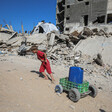31 July 2014

A man walks past the building housing Al-Aqsa TV, destroyed by an Israeli air strike in Gaza City, on 31 July.
APA imagesWriters, bloggers, journalists and activists in Gaza are scrambling to tell their stories and inform the outside world about the atrocities that Israel continues to commit as the weeks-long assault destroys lives, homes, clinics, hospitals, offices and UN shelters across the Gaza Strip.
After Israel bombed the sole power plant, plunging Gaza into darkness and leaving hospitals and homes with scarce electricity, and as mobile phone networks are damaged or destroyed, getting information to the outside world — as well as within Gaza itself — is becoming increasingly difficult.
“Though war is not something new to us in Gaza — I myself survived two — in 2008-09 and 2012 — this is the scariest and most blood-curdling one,” writes activist Ayah Bashir, in a moving article for the online publication Middle East Eye.
Twitter and Vine user Farah Baker, 16, has been posting regular updates and videos of the scene outside her home in Gaza.
Twitter user Mohammed Suliman has been also been posting updates as electricity allows.
Voices from Gaza
In an interview with The Electronic Intifada on Thursday, sixteen-year-old Hala Joudeh said “[Israel has] just run out of targets, they’re just randomly bombing.” She described being awoken by an Israeli rocket hitting her building this morning.
“I was still sleeping, since we don’t get any sleep at night,” she said.”I woke up to the sound of the explosion and the windows smashing. A friend called me and she said it was our building that had been hit.”
Hala left her home, she said, to meet with families who had been forcibly displaced from their homes and had sought refuge at a nearby United Nations shelter. “It was really, really horrible,” she said. “They didn’t even have tap water. Women and children were just laying on the floor. They have nowhere else to stay. It was really tough, seeing all those people suffering.”
On Wednesday evening, I spoke with Khalil Abu Shammala, the executive director of Al-Dameer Association for Human Rights based in Gaza City. He was able to speak to me from the Xinhua news agency’s offices in Gaza City, one of the only places he said he could access the Internet and a clear phone line in order to communicate with his colleagues, his family and the outside world.
When describing the last three weeks of Israel’s assaults, Abu Shammala said that “it is worse than [Operation] Cast Lead,” referring to Israel’s assault on Gaza in 2008-09. “It is completely different because of the intensive bombardment, the intensive use of different types of weapons.”
Abu Shammala explained that it would take “ten years, day and night,” to rebuild Gaza and treat the impact of Israel’s assaults after the bombs stop falling. He implored international civil society to bring Israel to account and finally lift the seven-year siege on the Gaza Strip. “People are being killed because they demand to live in dignity,” Abu Shammala said. “The judge between us and Israel is international law.”
“A genocide”
“What is happening in Gaza right now is, in fact, a genocide,” said Dr. Haidar Eid, a political commentator and assistant professor at the Al-Aqsa University in Gaza. Eid recently spoke with broadcaster Michael Slate of the Michael Slate Show on KPFK in Los Angeles, California.
He said that the current assault on Gaza is the continuation of Israel’s policy of ethnic cleansing that began in the late 1940s. “I am the son of two refugees … both [my parents] died dreaming of the day that they would go back to their village,” Eid explained to Slate. Listen to the forty-minute interview below.
“My house keeps shaking,” explained Gaza-based writer and educator Sarah Ali to David Swanson, host of the independent radio program Talk Nation Radio in an interview recorded on 23 July.
Ali is a contributor to The Electronic Intifada and Al Jazeera, and her fiction is featured in Gaza Writes Back, a collection of short stories edited by Refaat Alareer (who lost his brother, Mohammed, last week in an Israeli airstrike). She describes in searing detail the continuous bombing from land, air and sea. Listen to the entire program below.
We are looking to hear from others in Gaza. Please contact us and let us know how to reach you by email and/or phone.






Comments
"Please contact us." - a luxury many simply cannot afford
Permalink Carol Scheller replied on
What can they say ? Can they speak safely before the aggression ends for sure ? Israel has targetted and killed 9 journalists, one just sleeping in his home. Many people who might bear witness are out of electricity (no E-mail) and coping with a household with small children without water in 30 degree temperatures where often 30 people must share a toilet that cannot flush. There are also food shortages. There are huge practical problems that need immediate solutions which seem impossible. Many people are trying to live with grief, anger, dispair and horror.There is total misery on an unimaginable scale. Many details of this horrible period will come out only when people have managed to survive.
Musician Phil Soussan suggests carpet bombing Gaza
Permalink Sharon O. replied on
Los Angeles musician Phil Soussan suggests carpet bombing Gaza: https://www.facebook.com/PhilS... (July 31 post)
UN Human Rights Council Universal Periodic Review - USA
Permalink Tupac Enrique Acosta replied on
UN Human Rights Council Universal Periodic Review USA: Complicity in Genocide
http://unpfip.blogspot.ca/2014...